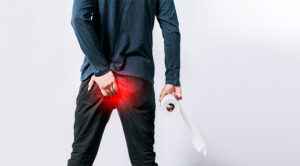REMEDY 1: Warm Sitz Baths (3x a Day)
A sitz bath is one of the most effective home remedies for fissures. It helps:
- Soothe the affected area
- Reduce pain and swelling
- Promote healing by increasing blood flow
You can sit in a tub of warm water or use a sitz bath kit. Optional additions like Epsom salt or baking soda can further enhance relief, but always consult your GI doctor before use. Avoid essential oils or perfumed products that can irritate the skin.
You may also alternate with a heating pad to keep the area warm and relaxed.
REMEDY 2: Keep the Anal Area Clean and Moisturized
Proper anorectal hygiene is crucial:
- Wash gently with warm water (avoid harsh soaps)
- Pat dry—don’t rub
- Avoid perfumed toilet paper or wet wipes
- Use coconut oil or prescribed topical ointments to keep the area moisturized and reduce itching
Always consult your doctor before applying any topical anesthetics or medicated creams.
REMEDY 3: Use Stool Softeners or Fiber Supplements (If Prescribed)
Over-the-counter stool softeners, laxatives, and fiber supplements can ease bowel movements and reduce strain. However:
- Only use these under a doctor’s supervision
- Avoid laxatives if your fissures are due to diarrhea
Aim for smooth, regular bowel movements to prevent further tears.
REMEDY 4: Modify Your Diet for Better Digestion
Your diet plays a major role in healing fissures. Focus on:
- High-fiber foods like fruits, vegetables, whole grains, and legumes
- Hydration: Drink at least 8–10 glasses of water daily
- Avoid constipating foods like dairy, white rice, fried items, and excessive caffeine or carbonated drinks
- Create balanced meals—not just raw salads—by combining fiber with healthy fats and protein
Eating the right foods ensures smoother bowel movements and supports natural healing.
REMEDY 5: Stay Physically Active
Regular exercise improves digestion and reduces constipation. Aim for:
- 30–45 minutes of daily activity (e.g., walking, yoga, swimming, strength training)
- Better metabolism and gut health
- Reduced chances of fissure recurrence
Even moderate movement helps keep your bowels regular and your digestive tract healthy.
When to See a GI Surgeon for Anal Fissures
While home remedies can heal many fissures, some tears may become chronic or recur frequently, especially if:
- The fissure doesn’t heal after 6–8 weeks
- Pain or bleeding worsens
- It interferes with your daily life
In such cases, consult a gastrointestinal (GI) specialist for an accurate diagnosis. Fissures can sometimes indicate more serious conditions like:
- Crohn’s disease
- Ulcerative colitis
- Rectal cancer
- Infections (HIV, herpes, syphilis, etc.)
Advanced Treatments for Chronic or Severe Fissures
If non-surgical treatments fail, your GI surgeon may recommend:
1. Laser Treatment for Fissures
Minimally invasive and highly effective, laser therapy uses a diode laser to remove the fissure and promote healing. It offers:
- Quick recovery
- Minimal bleeding
- High success rate
2. Lateral Internal Sphincterotomy (LIS)
In more severe cases, your surgeon may perform a LIS procedure, which involves cutting a small portion of the anal sphincter muscle to relieve pressure and allow healing. The surgery has a success rate above 95% and is a trusted solution for chronic fissures.
Final Thoughts: Don’t Ignore Your Symptoms
If you’re dealing with ongoing pain, bleeding, or discomfort from anal fissures, home remedies are a great first step. But for long-lasting relief and to avoid complications, consult a qualified GI surgeon. Prompt treatment means faster healing, fewer recurrences, and improved quality of life.





